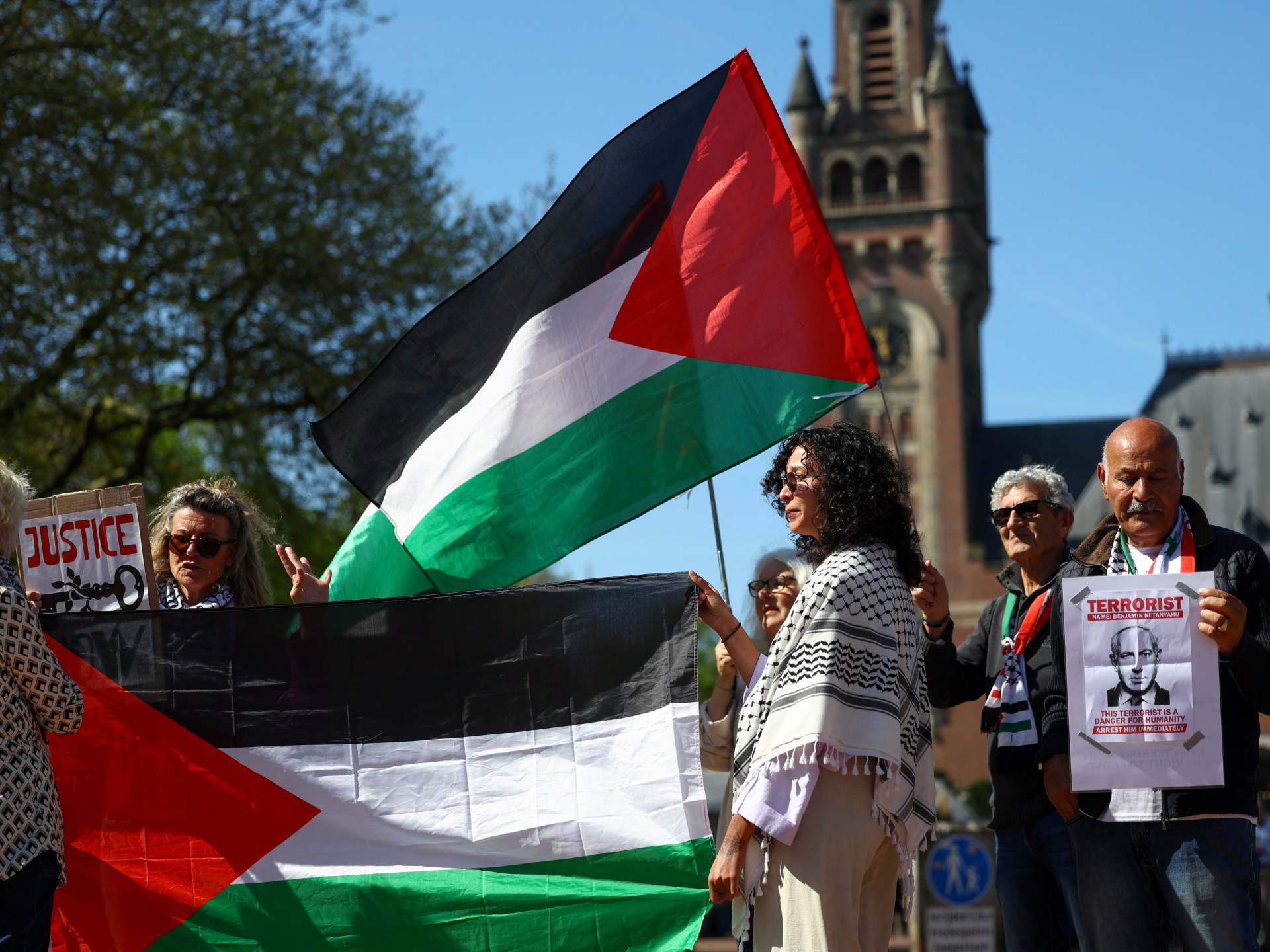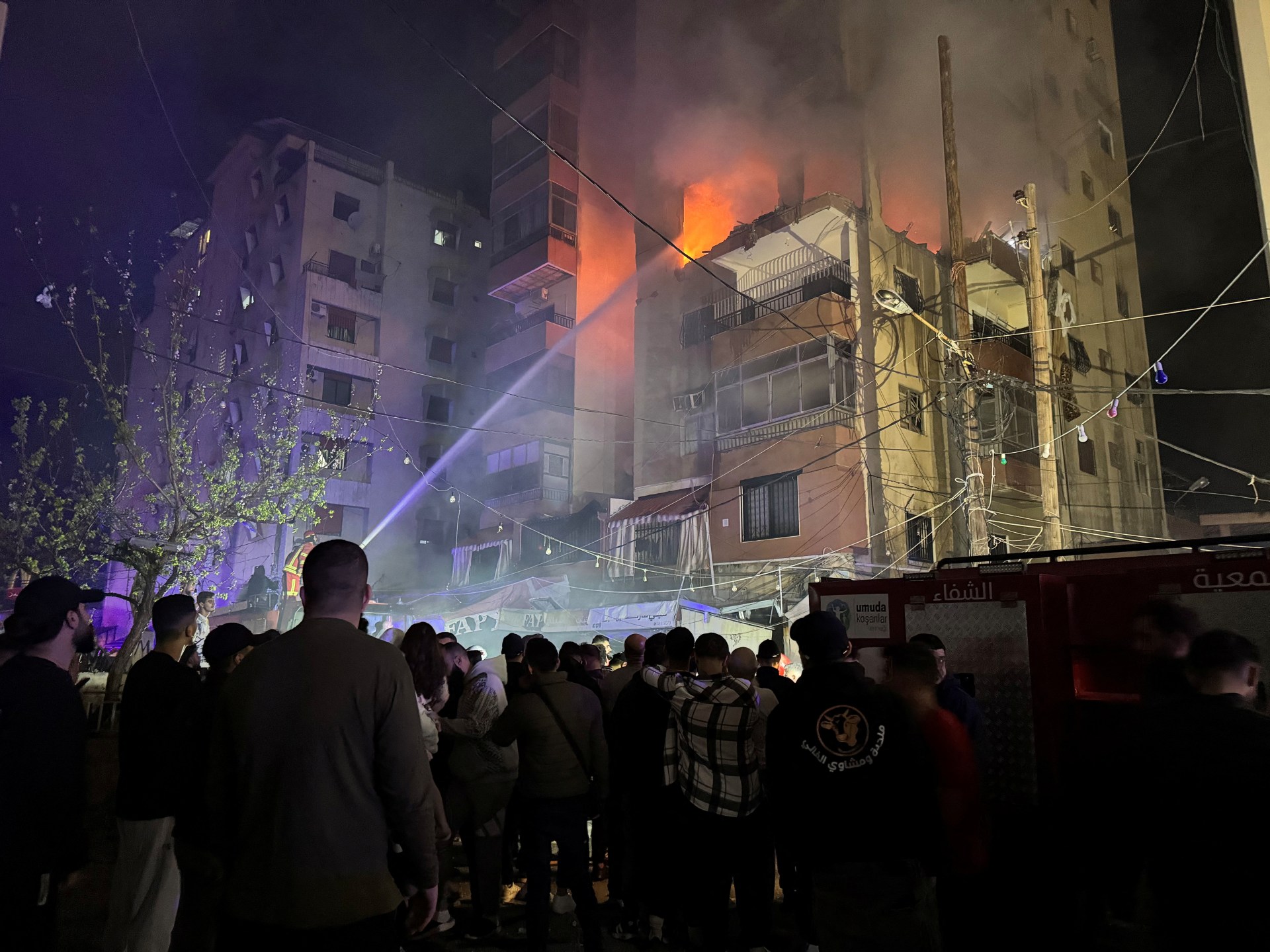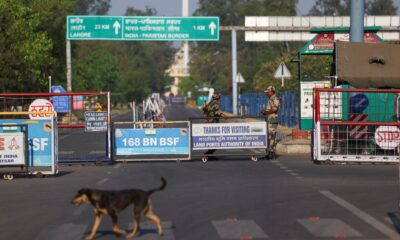Middle East
Drones hit ‘Freedom Flotilla’ Gaza aid ship in international waters | Israel-Palestine conflict News

Freedom Flotilla Coalition demands Israel answer to violations of international law, including blockade and ‘bombing of our civilian vessel’.
A ship carrying aid to Gaza in a bid to break Israel’s blockade has been hit by drones in international waters off Malta, according to the Freedom Flotilla Coalition (FFC), the group that organised the mission.
The FFC said in a statement on Friday that the vessel, now located 14 nautical miles (25km) from Malta, was the target of two drone strikes while on its way to Gaza. The ship had been seeking to deliver aid to the besieged enclave, where aid groups warn people are struggling to survive following a two-month total blockade by Israel.
“Armed drones attacked the front of an unarmed civilian vessel twice, causing a fire and a substantial breach in the hull,” the group said.
The statement did not directly accuse Israel of carrying out the attack.
However, it did demand that “Israeli ambassadors must be summoned and answer to violations of international law, including the ongoing blockade and the bombing of our civilian vessel in international waters”.
Israel has not commented on the drone strikes.
BREAKING: At 00:23 Maltese time, a #FreedomFlotilla ship was subjected to a drone attack. The front of the vessel was targeted twice, resulting in a fire and a breach in the hull. The ship is currently located in international waters near #Malta. An #SOS distress signal was sent. pic.twitter.com/J6oEQafuOb
— Freedom Flotilla Coalition (@GazaFFlotilla) May 2, 2025
Nicole Jenes of the FFC told Al Jazeera that the attack on the Conscience at 12.23pm local time (10:23 GMT) on Friday morning blew a hole in the vessel and set the engine ablaze.
The strike left 30 Turkish and Azeri activists on board engaged in a frantic effort to bail out water and keep the vessel afloat, she added.
The group statement said “a vessel from Southern Cyprus” had been dispatched after it sent SOS calls.
Later on Friday, the Maltese government said in a statement that the fire on the ship had been brought under control and that the vessel was being monitored by authorities. It was unclear whether the authorities had directly intervened to put out the fire and what has happened to the activists.
Jenes, currently in Malta, said that the group was not aware of the situation on board the ship as communication with the crew had been lost.
“They were hiding in the night in the rooms of the ship because they were afraid of the drones … We lost contact with them,” she said.
‘On the verge of total collapse’
The FFC, formed by peace activists from several countries last year, uses a converted trawler to try to defy Israel’s blockade on Gaza.
Israel halted humanitarian aid two months ago, shortly before it broke a ceasefire and restarted its war against Hamas, which has devastated the Palestinian enclave and killed more than 50,000 people.
“It’s very important to … understand this attack is an extension of the genocide that is happening in Gaza and cannot pass unpunished,” Jenes said, insisting that the FFC is asking the world to turn its eyes to the blockade.
The International Committee of the Red Cross (ICRC) said in a report released on Friday that the humanitarian response in Gaza is “on the verge of total collapse”.
“Six weeks of intense hostilities, combined with a complete blockage of aid for two months, have left civilians without the essentials they need to survive. Without an immediate resumption of aid deliveries, the will not have access to the food, medicines, and life-saving supplies needed to sustain many of its programmes in Gaza,” the ICRC said.
Middle East
ICJ hearing on Israel’s obligation to allow aid to Palestine: Key takeaways | Israel-Palestine conflict News

On May 2, the International Court of Justice (ICJ) concluded public hearings into what Israel’s obligations are regarding allowing United Nations agencies and other relief groups to work in the Palestinian territory it occupies.
A panel of judges has heard oral arguments from 40 countries since Monday, including China, France, Indonesia, Pakistan, Russia and the United Kingdom.
The court will likely deliberate for months before making a ruling, requested of it in December by the UN General Assembly.
Many of the participating states rebuked Israel for acutely restricting humanitarian aid into Gaza since launching a genocidal war on the enclave on October 7, 2023.
Israel has cut off all aid – food or medicine – entirely for the last two months, accelerating the starvation and medical crises.
Here are the key takeaways from the hearings:
Starvation threatens the Palestinians as a people
There was broad consensus that Israel, as an occupying power, would be obliged to allow aid organisations to deliver assistance to the people it occupies, particularly in Gaza, which Israel is also bombing.
Israel has weakened human rights norms through its violations in Gaza, Juliette McIntyre, a legal scholar at the University of South Australia, argued.
She pointed out that nearly all the states speaking at the hearings affirmed that the ability of Palestinians to receive humanitarian relief is necessary for their survival, to guard their right to eventual self-determination and safeguard the entire UN system and the treaties underpinning it.
Put bluntly, she said most states agree that Israel should not be allowed to starve civilians it occupies nor impede the relief work of UN agencies.
“Every state, except for two, agrees that Israel is an occupier and it owes certain obligations,” she told Al Jazeera.

What did Israel say?
Israel submitted written statements which called the hearings a “circus” and accused the court of anti-Semitism.
On top of that, it claimed that it has no obligation to work with what it described as compromised UN organs or aid groups and that its sovereign right to “defend itself” takes priority over its responsibility to deliver aid to the people it occupies.
This is not the first time Israel has refused to attend ICJ sessions leading to an advisory opinion.
The US statement
The US defended Israel, said Heidi Matthews, assistant professor of law at York University, Canada.
She added that the US tried to deny the severity of the situation and shield Israel from accountability by deliberately not speaking about the facts on the ground.
According to Matthews, while the US mainly said the ICJ should advise Israel to uphold its legal obligations under international law, it did not provide details of Israel’s conduct or call for Israel to take concrete steps to mitigate the humanitarian crisis it created.
“This kind of highly formalist and factually empty approach to law is characteristic of one form of fascist engagement with legal argument,” Matthews told Al Jazeera.
The US also tried to “spook” the court by bringing up Israel’s unsupported allegations that the UN relief agency for Palestinians (UNRWA) had been infiltrated by Hamas, said Adel Haque, a legal scholar at Rutgers University.
In October 2024, Israel banned UNRWA, which aids the Palestinians made refugees by the Zionist ethnic cleansing that made way for the declaration of Israel as a state in 1948.
The US is betting that the court can be swayed, Haque said, and so it is trying to encourage a more “general” advisory opinion.
“Basically, if the advisory opinion is made at such a high level of generality, then it wouldn’t say anything about Israel’s conduct at all,” he told Al Jazeera.
More than two million Palestinians in Gaza are starving as they face genocidal levels of violence at Israel’s hands.
ICJ cases as a substitute for action?
While ICJ advisory opinions reaffirm international laws and norms, its non-binding opinions cannot change facts on the ground, and some countries may be seeking ICJ opinions rather than take concrete, coordinated action against Israel, said Haque.
“Many [European states] have come before the ICJ in these hearings to say Israel is not fulfilling its obligations. But the question, now, is what are these states going to do about it?” he told Al Jazeera.

He noted the UK had used the recent hearings to denounce Israel’s obstruction of aid and to speak about its decision to halt arms sales to Israel, not enough of an action, he added.
France also spoke about the need for Israel to quickly facilitate aid into Gaza.
But the statements appear to be attempts to substitute for Europe’s collective failure to take urgent action against Israel for its conduct in Gaza, said Haque.
“The onus is on states to decide what they are going to do about [Israel’s actions] and not to wait for the court to rule on what they already know,” Haque added.
When and how will the ICJ rule?
The ICJ is not expected to issue an advisory opinion for months.
The non-binding advisory opinion will likely not compel Israel or member states to change course, according to legal scholars.
Israel has ignored an earlier binding provisional measures by the ICJ ordering it to scale up humanitarian aid and end acts of genocide in Gaza as a result of a genocide case brought against Israel by South Africa in December 2023.
No state has taken any action against Israel for failing to implement the provisional measures.
McIntyre believes the court will eventually issue a narrow ruling that outlines Israel’s responsibilities to facilitate aid and cooperate with UNRWA.
By the time the court issues its opinion, tens of thousands of Palestinians may have already starved to death, or been ethnically cleansed by Israel.
“The advisory opinion won’t solve the problem on the ground and genuine action [by states] needs to be taken,” warned McIntyre.
Middle East
Lebanon warns Hamas against attacks threatening nation’s security | Israel attacks Lebanon News

President Joseph Aoun says Lebanon must not be used as a launchpad for instability or be dragged into unnecessary wars.
Lebanon’s top security body has warned the Palestinian group Hamas against using the country’s territory for acts that could undermine national security, after rocket fire towards Israel led to counterstrikes.
The Higher Defence Council issued the warning on Friday as Lebanon faces growing United States pressure to disarm groups outside state control, following a 14-month war between Israel and the armed Lebanese group Hezbollah, an ally of Hamas.
Lebanese authorities are also trying to establish their authority throughout the country, particularly in the south near the border with Israel.
Israel has violated the US-brokered November 2024 truce agreement on a near-daily basis, according to Lebanese authorities, including three air attacks on the capital Beirut.
In a statement, the council headed by President Joseph Aoun said Lebanon must not be used as a launchpad for instability or be dragged into unnecessary wars.
It added that “the utmost measures and necessary procedures will be taken to put a definitive end to any act that violates Lebanese sovereignty.”
Aoun, who previously served as army commander, has pledged to bring all weapons in the country under the state’s authority, but has admitted that disarming Hezbollah, which the US has been pressuring Lebanon to do, is a “delicate” matter.
Mohammad al-Mustafa, secretary-general of the council, told reporters on Friday that while Aoun highlighted the importance of Palestinian rights, he also stressed that Lebanese stability should not be compromised.
Hamas has a longstanding presence within Lebanon, including in camps across the country that host hundreds of thousands of longtime Palestinian refugees, and where Lebanese security forces have long had only limited authority.
Along with Hezbollah, Hamas fighters in Lebanon fired rockets across the southern border into Israel in solidarity with Palestinians after Hamas’s October 7, 2023 attack, when Israel began a huge bombardment campaign in Gaza.
Since then, Israeli air attacks have killed several Hamas commanders in Lebanon, including the group’s deputy chief in early 2024.
Israel has cited security concerns for its continued deadly raids on Lebanon, despite the ceasefire.
In a bid to address the concerns of Israel and the US, which brokered the ceasefire, the Lebanese army arrested Lebanese and Palestinian individuals accused of firing rockets towards Israel on March 22 and March 28.
No group claimed responsibility for the attacks, and Hezbollah has denied any involvement.
But a Lebanese security source told the AFP news agency that security forces arrested three Hamas members.
The council said legal proceedings would begin early next week against those detained over the rocket fire in March.
Middle East
Sudanese paramilitary RSF kills 19 after taking city of al-Nahud: Sources | Sudan war News

Control over city gives the RSF strategic advantage in its bid to take Darfur capital el-Fasher, located 400km to the west.
Fighting in the Sudanese city of al-Nahud, a strategic city in West Kordofan state acting as a gateway to the Darfur region, has killed 19 people and left 37 wounded, according to sources who spoke to Al Jazeera, in the latest eruption of violence in the brutal two-year civil war.
Local sources told Al Jazeera that the paramilitary Rapid Support Forces (RSF), which declared on Telegram that it had “liberated” al-Nahud from the Sudanese Armed Forces (SAF) on Thursday, had rampaged through neighbourhoods, looting the market, houses and cars.
Al Jazeera understands that a doctor, a journalist and a police officer were among those killed as paramilitaries overcame the city, held by the SAF since the start of the conflict that has left tens of thousands dead and uprooted more than 12 million.
Control over al-Nahud has become a priority for both the RSF and SAF as fighting between the pair intensifies in Darfur, where 542 people have been killed in the past three weeks alone, according to the United Nations on Thursday.
The RSF has been doubling down on Darfur in recent weeks after losing the national capital, Khartoum, last month, in a bid to seize regional capital el-Fasher, the last major population centre still in the army’s hands, located 400 kilometres (250 miles) west of al-Nahud.
Recent violence in el-Fasher and the nearby refugee camps of Zamzam and Abu Shouk has caused hundreds of thousands of people to flee 60km (37 miles) across the desert to the town of Tawila.
As it continues its campaign in Darfur, the paramilitary group has also been inching closer to Khartoum again, shelling the presidential palace in its second attack on the capital in less than a week.
On Saturday, the RSF bombarded the army’s General Command headquarters in Khartoum.
Volker Turk, the UN high commissioner for human rights, commenting on the death toll in Darfur and extrajudicial executions conducted by both sides in Khartoum state, said on Thursday that the “horror unfolding in Sudan knows no bounds”.
The conflict between SAF, led by Abdel Fattah al-Burhan, and the RSF’s Mohamed Hamdan “Hemedti” Dagalo has divided Sudan in two, with the army holding sway in the north and east, while the RSF controls most of Darfur and parts of the south.
-

 Education2 days ago
Education2 days agoEducation Department opens investigation into Chicago Public Schools
-

 Sports2 days ago
Sports2 days agoNovak Djokovic pulls out of Italian Open ahead of French Open
-

 Sports1 day ago
Sports1 day agoLondon Marathon: Why more people than ever before are running marathons
-

 Conflict Zones1 day ago
Conflict Zones1 day agoThe $10bn India-Pakistan trade secret hidden by official data | Trade War News
-

 Lifestyle1 day ago
Lifestyle1 day agoDiego Boneta on debut novel ‘The Undoing of Alejandro Velasco’
-

 Middle East2 days ago
Middle East2 days agoWhat is behind the violence in Syria? | Syria’s War News
-

 Asia2 days ago
Asia2 days agoDeepfake porn is destroying real lives in South Korea
-

 Europe2 days ago
Europe2 days agoIdaho student killings: The latest pre-trial developments in the case of quadruple murder suspect Bryan Kohberger




